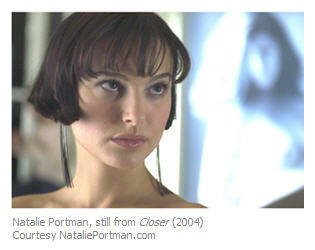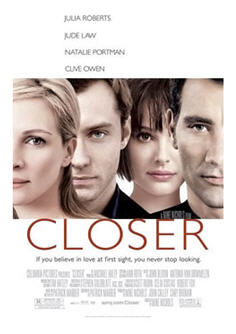Let’s hear it for cable! And for delicious films that we may never have seen when they were released to the theaters. Like Closer – an unexpected treat I enjoyed last night, so effectively constructed that I watched it twice in succession.
 Closer
Closer
The characters are stunning. The dialog is smart and raw. Each of the players speaks of lies and truth, of being strangers, and desiring strangers. They couple and uncouple, feigning closeness, or perhaps convinced of it. They fall in love, fall out of love. They act with everyday cunning.
Directed by Mike Nichols (Carnal Knowledge) and written by Patrick Marber, Closer was released in 2004, boasting an impressive cast – Julia Roberts, Natalie Portman, Jude Law, and Clive Owen – and a complex set of romantic entanglements.
These four strangely disconnected individuals meet, are attracted, and become involved. Scenes assemble and reassemble in a satisfying circle that advances and retreats, filled with symmetrical moments, with rhythms that keep us slightly off balance and unable to attach allegiances to any of the characters. We’re unsure who to cheer on, whose love is sincere, and whose lies are the most damning.
Sexual Battlefield
How many of us are wounded on the sexual battlefield? How many refuse to admit, even years later, that we never truly knew our partner? And if the relationship does not end, and appears to run smoothly – do lies matter?
Closer addresses the possibility that not knowing our lovers may be a blessing, or an inevitability; truth is wielded as a weapon and an excuse, just as we may brandish our lies. The women and the men both seem to realize that futures dangle from a fragile chain of words.
The particular battlefield between Clive Owen’s and Jude Law’s characters – each competing at different points for both women – creates a mesmerizing tug-of-war. The prize is a woman’s body, as territory to be taken and held. Is love even present? Is sexual conquest the end, or the means to an end?
 Power and Temptation
Power and Temptation
While each character takes a turn in alternating positions of strength, certitude, weakness and doubt, we watch as they resist or give in – to a kiss, a cigarette, to carnal lust more fully developed. They all lie, while insisting on a goal of truth like some false god. Truth as excuse. Truth as selfishness. Truth as capacity to gut.
When Jude Law’s character attempts to leave Natalie Portman for Julia Roberts, he says “I fell in love with her,” as though that absolves him of accountability for a year of cheating.
Portman’s response:
As if you had no choice? There’s a moment. There’s always a moment. I can do this, I can give in to this, or I can resist it.
Seduction and Uncertainty
Nichols uses remarkable restraint in this film that blurs love and lust, with an “all’s fair in love and war” approach we see enacted by one of the characters. The film never goes too far, instead offering us the uncanny abilities of Portman and Roberts both to melt us with an expression. We’re nudged closer to experiencing the essence of seduction, if not love.
And so we ask ourselves: Are we compelled to transform lust into love when it endures for years? What breaks trust, and what rebuilds it? If the truth is orchestrated, is it actually a lie?
These men and women are nothing like us. These men and women are just like us. The register of intimacy may be deceptive. As are the uncomfortable questions that linger.
Image, Closer Poster, Wiki, fair use.
I spoke with an Ex on Friday. In exasperation he used my name followed by “Honey” and then went to cover it up when I asked that he not call me that… he didn’t mean… and I know he didn’t mean it. He didn’t mean it as an endearment when we were together. Our interactions are fascinating to watch, from a removed perspective. His denial of the fact that at one time we were intimate; my acceptance of it and occasional discomfort with it as that past intimacy is not something that we can deny happened despite it no longer being there. We will always have that knowledge of one another – denying it doesn’t work.
And yet, the more I know him without that intimacy, the less I know him as a person as I am no longer sure who is the real person and who is the lie and what was truth and what was the lie? This morning I found myself wondering if the person he was with me was more the person he wanted to be then the person that he truly is… or was he himself with me and this person is his inability to trust that he is worth knowing for who he really is? He spent most of his life hiding aspects of himself – he didn’t hide them from me and yet, he has returned to hiding them or simply denying that they ever existed…
And I am not sure that this goes with the post except that it is about the dynamics, the honesty and the dishonesty, the role that lust plays in something and love and how love can exist and be surrounded with dishonesty and lies… and once those lies are there – can we pretend to trust and find that we are seriously taking the leap of faith to trust?
You describe this movie in such a way that I want to see it…
Have you seen Invention of Lying?
You know, TE – some people are who they present themselves to be, as we get to know them over time and in different ways. An old boyfriend from several years ago – perhaps the most significant relationship I’ve had since divorcing – was very much the man he showed himself to be. In fact, he was even lovelier as we got to know each other, very slowly.
My own ex was certainly not who I thought he was. It took years before I realized the many layers to the man. And of course, it isn’t a gender thing. It’s a human thing. And we all continue to evolve in good ways and not so good ways, depending on your viewpoint.
Yes, this movie was incredibly absorbing. It sucked me in pretty quickly, and was so compelling that as soon as it was done, I went back and watched the entire film again, start to finish, picking up on even more signals and subtleties. It’s a terrific movie.
Haven’t seen Invention of Lying…
And you raise whole other areas of discussion – when we remove physical intimacy from the equation, do we encounter another person altogether? How tangible is honesty or dishonesty? Where does trust come from?
Another one I couldn’t watch due to the adultery theme. Don’t know when I’m going to get over that!
My longest post-divorce relationship lasted 5 years. When it was finally over I realized that he had been telling and showing me who he was from the very first, I just didn’t want to see/hear it. Kind of the opposite of what you’re saying. Ex-husband – not too sure I ever really knew him, even after 20 years together.
It’s a dilemma, that’s for sure.
Oh, that movie has texture. Loved it. Even though the infidelity aspect troubles my little scar. I love that line of Natalie Portman’s, and wish I had it when I needed it.
I think truth is hard to come by, but trust comes from caring about each other’s truths. Can we really know each other? Oh dear. My longest relationships are with my parents and sister, and I know beyond a shadow of doubt that I do not know them through and through. How can I expect more with my spouse, a newcomer on the scene?
Texture. Kate, that’s the perfect word. Trust. That’s a toughie. As for knowing people, truly knowing people, I’m not sure we ever can, with some. And maybe that’s not so bad, if we know the essence of their character, and we can trust that. I think a little mystery is a good thing. People are entitled to their private moments and experiences. But that core – we need to know and trust that. Some are good at hiding what’s at the core. And they show us what we want to see. Sometimes, that’s a problem.
I loved this movie for many reasons: the cast – four of my favs, the director – so talented, the reality of it all. I am going to have to find this and re-watch it soon.
This is the movie that introduced me to the beautiful music of Damien Rice…